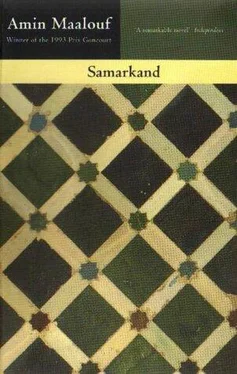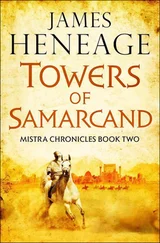In the Seljuk empire, at a time when it was the most powerful empire in the world, a woman dared to take power with her bare hands. Seated behind her tenting, she arrayed armies from one end of Asia to the other, named kings and vizirs, governors and qadis , dictated letters to the Caliph and sent emissaries off to the master of Alamut. To emirs who grumbled upon hearing her give orders to the troops, she responded: ‘Here it is the men who make war, but it is the women who tell them against whom to fight.’
In the Sultan’s harem, she was nicknamed ‘the Chinese woman’. She had been born in Samarkand, to a family originally from Kashgar, and, like her elder brother Nasr Khan, her face showed no intermingling of blood — neither the Semitic features of the Arabs, nor the Aryan features of the Persians.
She was Malikshah’s oldest wife by far. When she married him he was only nine years old and she was eleven. She waited patiently for him to mature. She had felt the first down of his beard, surprised the first spring of desire in his body and seen his limbs grow out, and his muscles swell up as he turned into the majestic windbag whom she soon learnt to tame. She had never ceased being the favourite wife — adulated, wooed, honoured and above all listened to and obeyed. At the end of a day, or upon his return from a lion hunt, a tournament, a bloody clash, a stormy assembly of the emirs or worse — a tedious work session with Nizam, Malikshah would find peace in the arms of Terken. He would peel off her diaphanous silk covering, snuggle up to her bare skin, play about, bellow and tell her about his exploits and what was tiring him. The Chinese woman would throw her arms around the excited lion, cocoon him, give him a hero’s welcome in the folds of her body and hold on to him long and tight, only letting go so that she could pull him back again; he stretched himself out with all his weight, conquering, breathless, panting, submissive and bewitched. She knew how to take him to the very limits of pleasure.
Then, gently his thin fingers would start to trace her eyebrows, her eyelashes, her lips, her earlobes and the lines of her moist neck; the lion was subdued, he was purring, growing sluggish, smiling. Terken’s words would then flow into the hollows of his soul. She would speak of him, of herself and their children. She would tell him anecdotes, recite poems for him, whisper parables laden with teachings. He was never bored for a second in her arms and he resolved to stay with her every evening. In his own rough, childish and animal way he loved her and was to love her until his last breath. She knew that he could refuse her nothing and it was she who planned his conquests of the moment, his mistresses or provinces. In the whole empire she had no rival other than Nizam, and in this year of 1092 she was on the verge of felling him.
Was the Chinese woman exultant at this? How could she be? The moment she was alone, or with Jahan her confidante, he would cry the tears of a mother and Sultana. She could curse her unjust fate and no one thought to blame her for it. Her eldest son had been chosen by Malikshah as his heir and was with him on all his trips and at all his ceremonies. His father was so proud of him that he displayed him everywhere, showing him his provinces one by one, telling him of the day when he would succeed him. ‘No Sultan ever left such a large empire to his son!’ he would tell him. At that time Terken was indeed overjoyed and no unhappiness soured her smile.
Then the heir died from a sudden, shattering and merciless fever. In vain the doctors prescribed bleedings and poultices but within two nights he passed away. It was said to be the work of the evil eye or even an undetectable poison. Terken managed to control her tears and pull herself together. When the period of mourning was over, she had her second son designated as heir to the throne. Malikshah took to him very quickly and showered him with surprising titles for a nine-year-old, but it was an era of pomp and ceremony: ‘King of kings, Pillar of the State, Protector of the Prince of the Believers’ …
The curse of the evil eye did not tarry in doing away with the new heir. He died as suddenly as his brother of a fever which was just as suspect.
The Chinese woman had a last son whom she asked the Sultan to designate as heir. The affair was trickier this time, since the child was only a year-and-a-half old and Malikshah was the father of three other boys who were all older. Two of them were born to a slave girl, but the eldest, named Barkiyaruk, was the son of the Sultan’s own cousin. What pretext could he use to brush them aside? Who better than this prince, who was doubly Seljuk, to be elevated to the rank of heir to the throne? Such was the view of Nizam, who wanted to interject some order into the Turkish squabbles, who had always been eager to institute some form of hereditary dynasty and who had insisted, with the best arguments in the world, that Malikshah’s eldest son should be designated heir, but with no success.
Malikshah dared not go against Terken, and as he could not nominate his son by her, he nominated no one preferring to risk dying without an heir, like his father and all his clan.
Terken was not satisfied and would not be until her lineage was duly assured — that is to say that more than anything in the world she desired to see Nizam, the obstacle to her ambitions, fall into disgrace. In order to obtain his death warrant, she was ready to use intrigue or issue threats, and day after day she followed the negotiations with the Assassins. She had accompanied the Sultan and his vizir on their journey to Baghdad. She was keen to be there for the execution.
It was Nizam’s last meal. The supper was an iftar , the banquet which marks the break of the fast of the tenth day of Ramadan. Dignitaries, courtiers and emirs of the army were all unusually abstemious out of respect for the holy month. The table was laid inside a huge yurt. Slaves carried torches to enable people to choose their food. Sixty ravenous hands stretched toward the huge silver platters, the best piece of camel or lamb and the choicest legs of partridge, skimming off flesh and sauce. They divided the food, ripped it apart and devoured it. If someone found himself in possession of a particularly toothsome item, he would offer it to a neighbour he wished to honour.
Nizam was eating little. That evening he was suffering more than usual. His chest was on fire and his insides felt as if they were being churned by the hand of an invisible giant. He was making an effort to hold himself upright. Malikshah was at his side, munching everything his neighbours passed to him. From time to time he was seen to look at his vizir out of the corner of his eye, thinking that he must be afraid. Suddenly he stretched his hand toward a plate of black figs, selected the plumpest and offered it to Nizam who accepted it politely and bit into it. What savour could figs have when one was three times condemned, by God, the Sultan and the Assassins?
By the time the iftar was over, it was already night. Malikshah jumped up, in a hurry to go and join his Chinese woman and tell her about the vizir’s grimaces. Nizam leant on his elbows and hoisted himself up with some effort. His harem’s tents were not far off and his old female cousin would have prepared a concoction of myrobalan to provide him some ease. He only had to take a hundred steps to be there. Around him was the inevitable confusion of royal camps with its soldiers, servants and wandering tradesmen. Now and then he could hear the stifled laugh of a courtesan. How long the path seemed, and he was dragging himself along it alone. Usually he was surrounded by a group of courtiers, but who now wished to be seen with an outlaw? Even the beggars had fled — what could they hope to obtain from a disgraced old man?
Читать дальше












